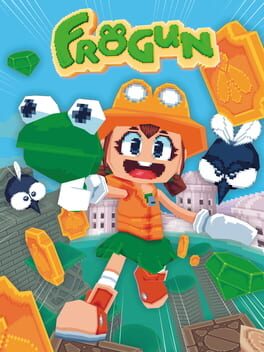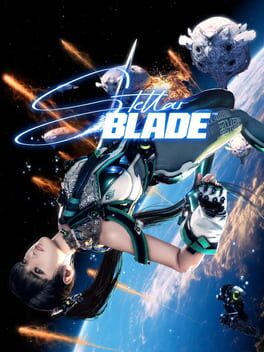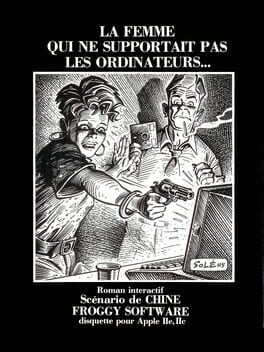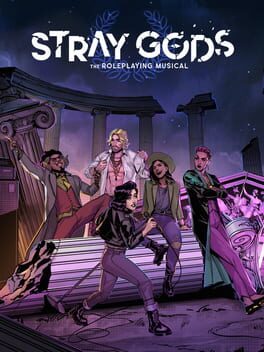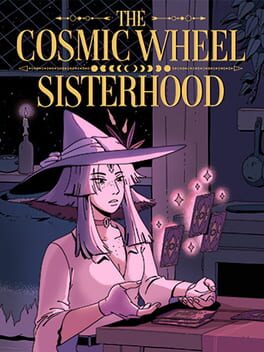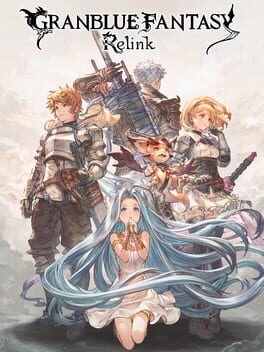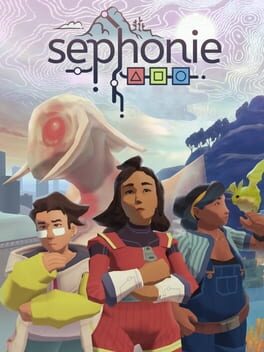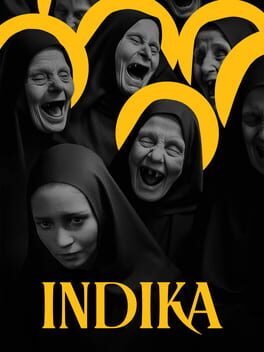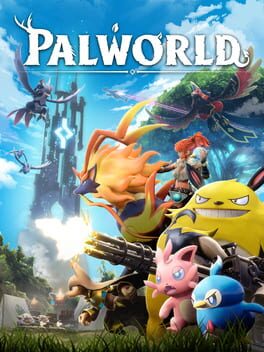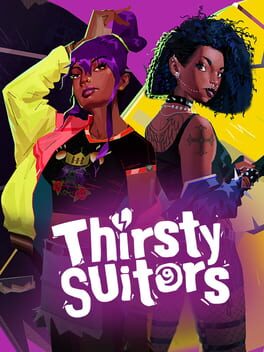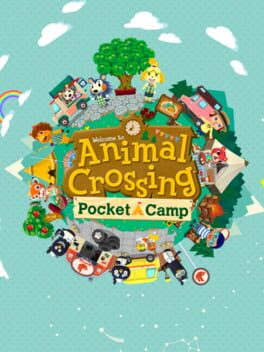LiasLola
2022
I found playing Frogun actively unbearable, sadly. I think this game destroys every possible burst of fun I could have with it as soon as it arises. I have to start the game multiple times a day just to complete one level - just complete, not even 100% - because my fight or flight instincts kick in as soon as the player character falls off a cliff because this game is really bad at communicating depth. Fascinatingly, this game has the opposite of what you would call a "game flow", to the point that I think this could've needed like an extra year just to get the controls and movement right. It has a nice artstyle at least.
2024
Stellar Blade, to me, felt like a B-movie whose budget was randomly doubled while in production. What I mean by this is: The production quality is top notch, but everything beneath that would be perfectly at home in a lower budget ""AA"" effort. From the sleazyness to the slightly undercooked gameplay to the agressively overconfident story (the story is mostly plot holes), Stellar Blade is highly polished trash. And I think that's very fun! It's not the best thing ever, but I enjoyed my time with it.
You can play this for free here: http://xyzzy.io/play/la-femme-qui-ne-supportait-pas-les-ordinateurs
And I would very much recommend you do, because this is a fascinating piece of video game history (and also suprisingly accurate for today)
And I would very much recommend you do, because this is a fascinating piece of video game history (and also suprisingly accurate for today)
I really really loved my time with Stray Gods and I definitely intend to return to check out some of the other paths the story could have played out (Although I suspect they won't be that different). It's a lovely visual novel with a moderate integration of player choice that really shines in the musical segments of the game! While your choices there don't feel like they change the course of the story all too often, they do heavily impact the style and tone of what's sung, which is a delightful thing to witness. The OST is really good and catchy, the voice performances are stellar and the visual style manages to tie each element together well enough. On the story side of things it's a bit messy sometimes, but always intriguing - Let's see what I can dig up in subsequent playthroughs! The entire experience left me wanting more and I think that's a good sign that they were onto something here. With a little more polish (the game crashed on me quite often), some more budget for animations and a tighter narrative and theming, this would've been even better, but I'm really glad the game's out there as it is.
2024
Animal Well is absolutely completely utterly - fine! It's good! It's fun! I especially like its visual identity, though I don't love its soundscape too much. The puzzles are creatively designed and the tools you get for exploration were suprising and well utilized. Do I think there's much more here? No, not for me. I read the articles detailing the games' secrets and what I find disappointing that - so far at least - the game's secrets don't really add any lore or backstory or theme to its world, leading to the secrets feeling a little shallow to me. But I'm also not really the person to dig deep in this type of game - if you are, you're probably gonna like Animal Well way more. Maybe it also had the misfortune of releasing alongside Lorelei and the Laser Eyes, which scratches that mystery solving itch waaay better - at least for me. Animal Well still is a cute game though that I will probably mostly remember for its outstanding visual design moreso than anything else.
I was already enamored with the demo, and the full version is even better. I absolutely love The Cosmic Wheel Sisterhood, it's a beautiful game that manages to create so much narrative intrigue through its core gameplay system of creating your own Tarot cards and then reading them. It's really fun designing your own card designs. There's also lots of lovely little moments where you are reminded of the choices you have made and cards you pulled, the game manages to really feel like a cohesive whole with a suprisingly large amount of impact the player has on the narrative - I imagine there's a relatively huge variety of ways the story can play out. I especially loved where they took the entire thing in the end, it's a really nice, explicitely political direction (although the implementation leaves some things to be desired).
There's also a lot of joy to be found in the interactions between characters and the way they develop. Some themes and moments really pulled on my heartstrings. Even though this game is about immortal witches, the way the story is told is really down to earth and focused on the small moments, it's kind. The game rules, I want to say, it absolutely rules. I played through it in one sitting (Yes, it's 5hrs long), it's that good. A lot of queer joy here, too. The Cosmic Wheel Sisterhood has impeccable vibes, a tight grip on its loose themes & a really fun and cleverly implemented central gameplay mechanic. It's a space I will return to, sometime in the future!
2023 is a really great year for visual novels.
There's also a lot of joy to be found in the interactions between characters and the way they develop. Some themes and moments really pulled on my heartstrings. Even though this game is about immortal witches, the way the story is told is really down to earth and focused on the small moments, it's kind. The game rules, I want to say, it absolutely rules. I played through it in one sitting (Yes, it's 5hrs long), it's that good. A lot of queer joy here, too. The Cosmic Wheel Sisterhood has impeccable vibes, a tight grip on its loose themes & a really fun and cleverly implemented central gameplay mechanic. It's a space I will return to, sometime in the future!
2023 is a really great year for visual novels.
After having completed the epilogue, I know finally feel comfortable rating this game. Granblue Fantasy: Relink is a game so thoroughly streamlined, so optimized for fun, that it's very hard not to enjoy your time with it. The gameplay is snappy and varied through all of the different unique characters with their own movesets and game plans, the presentation is beautiful and the main story goes over so fast there's literally no downtime. What happens after that is a cleverly designed loot grind to optimize your loadout and team, one that is so addictive even I wasn't able to shy away from it (normally, a single hour of grind would be a reason to drop a game). In short: It's a really fun game. And I was and am still able to derive a lot of joy from that. Granblue Fantasy: Relink is a completely frictionless game. And if you want exactly that, a fun way to spend 15-999hrs and not think about anything, I can't recommend it highly enough.
But this also results in me not really loving it. Because all this streamlining also results in a game experience that is entirely toothless, it has nothing to say. Its story is as bare-bones and clichéd as they come, it's characters mostly rough caricatures. Which is sad to me, as they didn't feel like that in the other Granblue media I looked at in preperation for this, neither in the anime nor in the (admittedly terrible) gatcha game. In a way, Granblue Fantasy: Relink lost a lot of soul in this streamlining, and no amount of optimization grind can fill that void. There are moments where that soul shines through, the completely voiced Fate Episodes i.e., or some smaller character interactions in the moment-to-moment gameplay, but overall, it's a little too streamlined, a little too frictionless. Which doesn't take away from the fact that it's still a very fun game, but I feel like it could've been a lot more.
But this also results in me not really loving it. Because all this streamlining also results in a game experience that is entirely toothless, it has nothing to say. Its story is as bare-bones and clichéd as they come, it's characters mostly rough caricatures. Which is sad to me, as they didn't feel like that in the other Granblue media I looked at in preperation for this, neither in the anime nor in the (admittedly terrible) gatcha game. In a way, Granblue Fantasy: Relink lost a lot of soul in this streamlining, and no amount of optimization grind can fill that void. There are moments where that soul shines through, the completely voiced Fate Episodes i.e., or some smaller character interactions in the moment-to-moment gameplay, but overall, it's a little too streamlined, a little too frictionless. Which doesn't take away from the fact that it's still a very fun game, but I feel like it could've been a lot more.
2023
hell yes.
I think this is Remedy's first game where the storytelling overwhelms the gameplay this intensely, and the results are absolutely glorious. Alan Wake 2 is completely streamlined to tell this one story and it doesn't really bother with extensive enemy encounters (which got really tedious really fast in the first game), instead it uses those moments more as a way to accentuate certain story moments and/or the general atmosphere. On that topic: I'm still absolutely in AWE (hehe) of Remedy's enviromental designers, the moodyness this game already has through its enviroments alone is really immense. The Dark Place is a game enviroment I'll talk about for years to come.
Alan Wake 2 also manages to turn the story of the first game into even more of a beautifully meta multimedia-mess. I can safely say that after playing I understand even less now, and I really love it. The entire story just clicked for me, weaving together the plot beats of the first game, CONTROL and its many new ideas quite seamlessly. And I love Saga as a protagonist.
I'm sure there've been many versions of what an Alan Wake 2 could've been. I'm very glad it's this.
(I only hope that Sam Lake has had his fair share of screen time now, because, at this point, his omnipresence in his own game felt quite self-indulgent.)
((ah yes and the chapter songs absolutely slap))
I think this is Remedy's first game where the storytelling overwhelms the gameplay this intensely, and the results are absolutely glorious. Alan Wake 2 is completely streamlined to tell this one story and it doesn't really bother with extensive enemy encounters (which got really tedious really fast in the first game), instead it uses those moments more as a way to accentuate certain story moments and/or the general atmosphere. On that topic: I'm still absolutely in AWE (hehe) of Remedy's enviromental designers, the moodyness this game already has through its enviroments alone is really immense. The Dark Place is a game enviroment I'll talk about for years to come.
Alan Wake 2 also manages to turn the story of the first game into even more of a beautifully meta multimedia-mess. I can safely say that after playing I understand even less now, and I really love it. The entire story just clicked for me, weaving together the plot beats of the first game, CONTROL and its many new ideas quite seamlessly. And I love Saga as a protagonist.
I'm sure there've been many versions of what an Alan Wake 2 could've been. I'm very glad it's this.
(I only hope that Sam Lake has had his fair share of screen time now, because, at this point, his omnipresence in his own game felt quite self-indulgent.)
((ah yes and the chapter songs absolutely slap))
2022
‚Matters of Care‘ by Maria Puig de la Bellacasa is (reductively described) a book about non-human agencies and what care can mean in those contexts. It’s about non-/human interdependency and vulnerability. One of its chapters is named ‘Touching Visions’, and it’s about touching, both in a metaphorical and physical way – not only human touch, but also the touch of plants, animals and things. One of the central ideas of this chapter can be summarized with the quote ‘You can’t touch without being touched’. For me, Sephonie is a game about this quote.
Sephonie is the name of an island with no clear location, somewhere far out in the sea. It’s a special and unique little ecosystem with its own quirks and natural wonders. Our three protagonists, all from different academic backgrounds, are there to investigate the ecosystem, how it works – its interdependencies. Over the course of the game, the one-directional analysis of creatures, done via the ONYX link-system, becomes more and more two-directional. The personal lives and experiences of the main characters seep into the island itself, memories become manifest, distorted; cities pulled into natural landscapes and vice versa. It’s not about how the natural wonders of the island work, its what they mean, what they become to mean in human contexts. A fish can mean a living organism, a smell but it can also mean the trip to the supermarket with the family, the one very weird date you once had, and so much more. Everything natural is hardwired into interdependencies with the “artificiality” of human worlds – and vice versa, and every little thing gains new meanings through this connection. This connection is always vulnerable, so it needs care to be sustained in an ethical way. But the quote of course also extends to human relationships. Where new topics arise. Like how borders create cuts in connections. On those parts I’ll have to dwell a little bit more, let me just say: Sephonie is excellently written, in every aspect.
Exploring Sephonie, the game, the island and [REDACTED], all these ideas come flooding back into my mind. The platforming is clunky as heck, the controls are the opposite of tight and responsive – but it’s still fun and very chill! The game connects all its elements into a wonderful whole, not seamlessly, but that’s exactly why it’s so amazing. The game moved me. I can’t touch without being touched.
Sephonie is the name of an island with no clear location, somewhere far out in the sea. It’s a special and unique little ecosystem with its own quirks and natural wonders. Our three protagonists, all from different academic backgrounds, are there to investigate the ecosystem, how it works – its interdependencies. Over the course of the game, the one-directional analysis of creatures, done via the ONYX link-system, becomes more and more two-directional. The personal lives and experiences of the main characters seep into the island itself, memories become manifest, distorted; cities pulled into natural landscapes and vice versa. It’s not about how the natural wonders of the island work, its what they mean, what they become to mean in human contexts. A fish can mean a living organism, a smell but it can also mean the trip to the supermarket with the family, the one very weird date you once had, and so much more. Everything natural is hardwired into interdependencies with the “artificiality” of human worlds – and vice versa, and every little thing gains new meanings through this connection. This connection is always vulnerable, so it needs care to be sustained in an ethical way. But the quote of course also extends to human relationships. Where new topics arise. Like how borders create cuts in connections. On those parts I’ll have to dwell a little bit more, let me just say: Sephonie is excellently written, in every aspect.
Exploring Sephonie, the game, the island and [REDACTED], all these ideas come flooding back into my mind. The platforming is clunky as heck, the controls are the opposite of tight and responsive – but it’s still fun and very chill! The game connects all its elements into a wonderful whole, not seamlessly, but that’s exactly why it’s so amazing. The game moved me. I can’t touch without being touched.
To quote Prof. Hager:
What is love?
Does love in fact exist inside this world?
Does love in fact exist outside this world?
If I speak of crossing through the ceiling of this world, you might laugh at me.
However, I want to transcend that ceiling.
That is my love.
... and transcend that ceiling they did. And they did it beautifully, charmingly und just so full of creativity!
(Guide for the people who are stuck: https://gamefaqs.gamespot.com/ps/573238-moon/faqs/50336)
What is love?
Does love in fact exist inside this world?
Does love in fact exist outside this world?
If I speak of crossing through the ceiling of this world, you might laugh at me.
However, I want to transcend that ceiling.
That is my love.
... and transcend that ceiling they did. And they did it beautifully, charmingly und just so full of creativity!
(Guide for the people who are stuck: https://gamefaqs.gamespot.com/ps/573238-moon/faqs/50336)
2024
I struggle a bit when thinking about Indika. Because on paper it does a lot of things I really like. Especially the enviroment design and general weirdness of the whole experience really stood out to me. But it also feels a little aimless sometimes, and especially its portrayal of sexual assault is a point where they should most definitely have gone back to the drawing board. If you're interested in Indika at all, I think it's a very good idea to pick it up. And meanwhile, I'll sit here, in my little corner, thinking about why I don't love it the way I thought I would.
2024
I think this mainly exists to draw people in with the shock factor that is "Pokemon with guns and slave labour" and keep them engaged with a mediocre survival gameplay-loop. Which is fine & all but makes this kinda equivalent to all those Winnie Pooh horror movies that popped up when that character entered the public domain. What is interesting tho it's more gruesome mechanics also at least a logical evolution of Pokémon's internal logic, just brought to the extreme. In the Open World mainline games, Pokémon are already mostly resources to farm for exp or items and to use in combat for your own gains. Only these games try to contextualize the relationship between monster and trainer within the realms of friendship, whereas this game just stays within the gameplay logic of "exploit these monsters for your own gain" and just dials it up a lot. Both result in gameplay experiences that are devoid of any meaning, although Palworld feels much more cynical and I feel that cynicism has a kinda violent aspect to it. It has nothing to say about the ideas it portrays, instead joyfully revelling in the violence it reproduces.
2023
Thirsty Suitors is an incredibly charming game with a strong emotional core brought down by its boring turn-based combat and some pacing issues. Admittedly, the combat has a fun thematic framing but on the gameplay side of things it feels really flat and uninteresting from the third fight onwards. The skateboarding is more interesting, though I found the controls a little too clunky to really enjoy it. But: I loved how overly expressive every animation was, how each of the boss fights had their own visual theme and accompanying soundtrack how the game portrays its themes of intergenerational trauma and the complexities of interpersonal relationships within marginalized communities and how much joy the game still evokes while tackling these themes. Those elements is what I'll be remember this game by, I think. And those memories will be fond ones.
I despise this game with all my heart. Never have I seen game design this morally corrupt, this worthless in creating fun interactions for the player. The entire game is one huge, joyless grind, designed to make playing it a habit, to make booting it up every three hours an addiction. It features three different subscription models, on top of lootboxes, on top of the metric ton of microtransactions. But I think ‘micro’ is the wrong word here, so let me phrase it another way: 'Animal Crossing: Pocket Camp' hides an excessive amount of content behind paywalls. What isn’t hidden is the daily grind to make you, the player, addicted. What is hidden is the fun cosmetics and furniture – The possibility of customizing your clothing, your campsite in a fun way. But doing that is expensive. Playing Pocket Camp is expensive in general, it feeds on your time and produces emptiness, with the promise of less emptiness if you just buy into it. If you just buy into it, it honors you, tells you you did amazing – ‘Welcome to the Pocket Camp Club’ it says jubilantly – and creates, as a reward, more emptiness for you to enjoy.
Animal Crossing: Pocket Camp is what happens when rip out the joyous heart of a beloved series and replace it with greed. Instead of giving something to the player, this game just takes. And keeps on taking. It took a lot of money from me. It took a lot of my time. And, in the end, I filled the emptiness it gave me with disgust. For all the abusive gameplay loops. For the morally bankrupt monetization. Please, do not play this game. And if you currently are, I beg of you, step away. Remember the sunk cost fallacy. You are worth way more than what his game considers you to be.
Animal Crossing: Pocket Camp is what happens when rip out the joyous heart of a beloved series and replace it with greed. Instead of giving something to the player, this game just takes. And keeps on taking. It took a lot of money from me. It took a lot of my time. And, in the end, I filled the emptiness it gave me with disgust. For all the abusive gameplay loops. For the morally bankrupt monetization. Please, do not play this game. And if you currently are, I beg of you, step away. Remember the sunk cost fallacy. You are worth way more than what his game considers you to be.
Final Fantasy VII: Rebirth is a behemoth. It's filled to the brim with sights to see, places to be, things to do and monsters to fight. And it... overwhelmed me. I've never been this overwhelmed by any game, which may be because I thought I knew what to expect after playing Remake. I've never been so wrong. The devs added an immense amount of new features and tweaked the central systems to the point of unrecognizability. The end result is, at its core, the most full open world game I've experienced yet - keep in mind, there aren't many, I don't really vibe with these games normally. And, in the end, I did experience almost none of it, instead going for my established Xenoblade-strategy of just always waltzing over to the next map marker and adjusting the difficulty when the going got too tough. So yea, in the end, my experience with Rebirth was that of a Xenoblade game, mostly. But, and this is actually the important bit, I still enjoyed that experience immensely.
Because, oh, does this game have the vibes: the wonderful enviromental and character designs, the quirkyness, the really esoteric and kinda hippie enviromentalist message, the clusterfuck of a story. It's raw and yet beautifully realized. Final Fantasy VII: Rebirth, for me, is an engine running entirely on its vibes and themes, pulling off the most difficult part of creating any trilogy that aims to tell a single story: not making the second part shit. Only time will tell if it avoids the other pitfall of feeling mostly irrelevant after the conclusion of the story.
Because, oh, does this game have the vibes: the wonderful enviromental and character designs, the quirkyness, the really esoteric and kinda hippie enviromentalist message, the clusterfuck of a story. It's raw and yet beautifully realized. Final Fantasy VII: Rebirth, for me, is an engine running entirely on its vibes and themes, pulling off the most difficult part of creating any trilogy that aims to tell a single story: not making the second part shit. Only time will tell if it avoids the other pitfall of feeling mostly irrelevant after the conclusion of the story.
